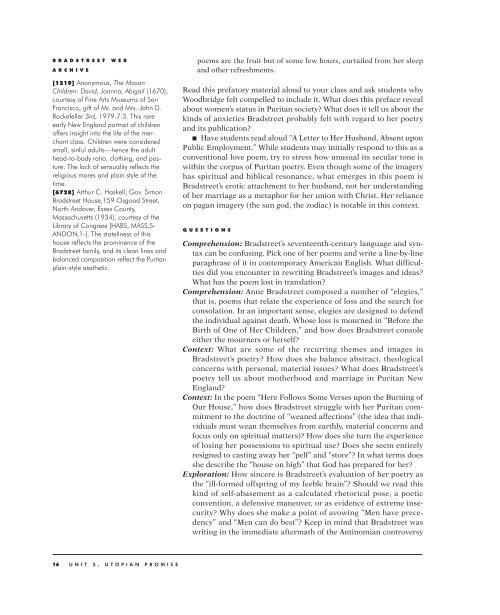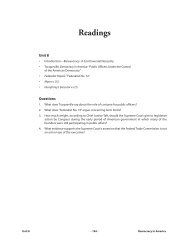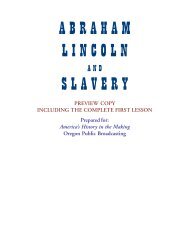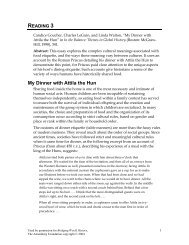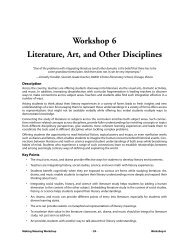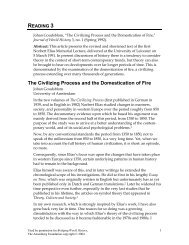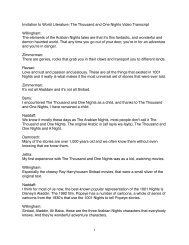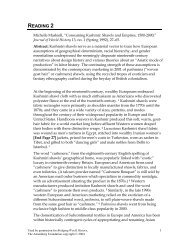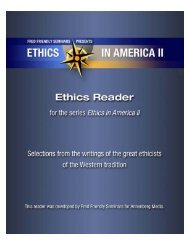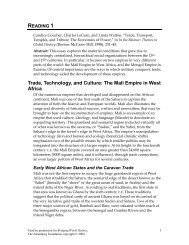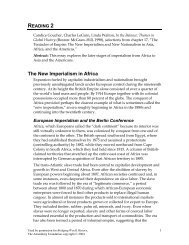UTOPIAN PROMISE - Annenberg Media
UTOPIAN PROMISE - Annenberg Media
UTOPIAN PROMISE - Annenberg Media
Create successful ePaper yourself
Turn your PDF publications into a flip-book with our unique Google optimized e-Paper software.
BRADSTREET WEB<br />
ARCHIVE<br />
[1219] Anonymous, The Mason<br />
Children: David, Joanna, Abigail (1670),<br />
courtesy of Fine Arts Museums of San<br />
Francisco, gift of Mr. and Mrs. John D.<br />
Rockefeller 3rd, 1979.7.3. This rare<br />
early New England portrait of children<br />
offers insight into the life of the merchant<br />
class. Children were considered<br />
small, sinful adults—hence the adult<br />
head-to-body ratio, clothing, and posture.<br />
The lack of sensuality reflects the<br />
religious mores and plain style of the<br />
time.<br />
[6728] Arthur C. Haskell, Gov. Simon<br />
Bradstreet House,159 Osgood Street,<br />
North Andover, Essex County,<br />
Massachusetts (1934), courtesy of the<br />
Library of Congress [HABS, MASS,5-<br />
ANDON,1-]. The stateliness of this<br />
house reflects the prominence of the<br />
Bradstreet family, and its clean lines and<br />
balanced composition reflect the Puritan<br />
plain-style aesthetic.<br />
16 UNIT 3, <strong>UTOPIAN</strong> <strong>PROMISE</strong><br />
poems are the fruit but of some few hours, curtailed from her sleep<br />
and other refreshments.<br />
Read this prefatory material aloud to your class and ask students why<br />
Woodbridge felt compelled to include it. What does this preface reveal<br />
about women’s status in Puritan society? What does it tell us about the<br />
kinds of anxieties Bradstreet probably felt with regard to her poetry<br />
and its publication?<br />
■ Have students read aloud “A Letter to Her Husband, Absent upon<br />
Public Employment.” While students may initially respond to this as a<br />
conventional love poem, try to stress how unusual its secular tone is<br />
within the corpus of Puritan poetry. Even though some of the imagery<br />
has spiritual and biblical resonance, what emerges in this poem is<br />
Bradstreet’s erotic attachment to her husband, not her understanding<br />
of her marriage as a metaphor for her union with Christ. Her reliance<br />
on pagan imagery (the sun god, the zodiac) is notable in this context.<br />
QUESTIONS<br />
Comprehension: Bradstreet’s seventeenth-century language and syntax<br />
can be confusing. Pick one of her poems and write a line-by-line<br />
paraphrase of it in contemporary American English. What difficulties<br />
did you encounter in rewriting Bradstreet’s images and ideas?<br />
What has the poem lost in translation?<br />
Comprehension: Anne Bradstreet composed a number of “elegies,”<br />
that is, poems that relate the experience of loss and the search for<br />
consolation. In an important sense, elegies are designed to defend<br />
the individual against death. Whose loss is mourned in “Before the<br />
Birth of One of Her Children,” and how does Bradstreet console<br />
either the mourners or herself?<br />
Context: What are some of the recurring themes and images in<br />
Bradstreet’s poetry? How does she balance abstract, theological<br />
concerns with personal, material issues? What does Bradstreet’s<br />
poetry tell us about motherhood and marriage in Puritan New<br />
England?<br />
Context: In the poem “Here Follows Some Verses upon the Burning of<br />
Our House,” how does Bradstreet struggle with her Puritan commitment<br />
to the doctrine of “weaned affections” (the idea that individuals<br />
must wean themselves from earthly, material concerns and<br />
focus only on spiritual matters)? How does she turn the experience<br />
of losing her possessions to spiritual use? Does she seem entirely<br />
resigned to casting away her “pelf” and “store”? In what terms does<br />
she describe the “house on high” that God has prepared for her?<br />
Exploration: How sincere is Bradstreet’s evaluation of her poetry as<br />
the “ill-formed offspring of my feeble brain”? Should we read this<br />
kind of self-abasement as a calculated rhetorical pose, a poetic<br />
convention, a defensive maneuver, or as evidence of extreme insecurity?<br />
Why does she make a point of avowing “Men have precedency”<br />
and “Men can do best”? Keep in mind that Bradstreet was<br />
writing in the immediate aftermath of the Antinomian controversy


